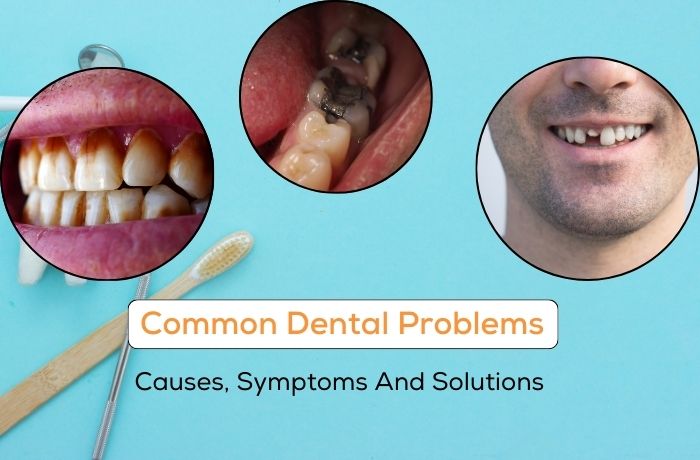Common Dental Problems: Causes, Symptoms, and Solutions

Maintaining good dental health is essential to your overall health. Not only does it help you smile with confidence, but it also plays a major role in your overall health. Poor dental hygiene can lead to various dental problems that, if left untreated, can cause discomfort and potentially more serious health problems.
In this blog, we'll explore some of the most common dental problems, their causes, symptoms, and effective solutions. We'll also share some home remedies for dental pain and tips on how to prevent these problems. Let's start learning how to maintain a healthy, pain-free mouth!
Most Common Dental Problems
a. Tooth decay (cavities):
Causes: Tooth decay, also known as cavities, occurs when bacteria in your mouth produce acids that erode your tooth enamel. This usually happens when you eat sugary or starchy foods and do not brush your teeth properly afterward.
Symptoms: You may notice toothache, sensitivity to hot or cold foods, and visible holes or pits in your teeth.
Solutions: Regular brushing and flossing, along with professional cleanings, can help prevent cavities. If you already have a cavity, your dentist may recommend a filling or fluoride treatment to restore your tooth.
b.Gum disease (gingivitis and periodontitis):
Causes: Gum problems start with plaque, a sticky film of bacteria that builds up on your teeth. If not removed by brushing and flossing, it can harden into tartar, leading to gum inflammation and infection.
Symptoms: Red, swollen gums that may bleed when you brush or floss, bad breath, and in severe cases, loose teeth.
Solutions:Early-stage gum disease (gingivitis) can be reversed with good oral hygiene and professional cleanings. More advanced cases (periodontitis) may require deeper cleaning procedures, such as scaling and root planing.
C. Tooth sensitivity:
Causes: Sensitivity occurs when the enamel wears away, exposing the underlying dentin, or when the gums recede, exposing the roots. This can be caused by harsh brushing, acid erosion, or gum disease.
Symptoms: A sharp pain or discomfort when eating hot, cold, sweet, or acidic foods and drinks.
Solutions:Using desensitizing toothpaste, avoiding acidic foods, and practicing gentle brushing can help manage sensitivity. For more severe cases, your dentist may suggest fluoride treatments or bonding.
D. Bad breath (halitosis):
Causes: Poor oral hygiene is the most common cause of bad breath. Food particles left in the mouth can decay and cause bad breath. Other causes include dry mouth, certain foods such as garlic, and medical conditions such as sinus infections.
Symptoms: Persistent bad breath from the mouth, often noticed by others.
Solutions: Improve your oral hygiene by brushing and flossing regularly, using mouthwash, and staying hydrated. If bad breath persists, it may indicate an underlying health problem that needs attention.
E. Tooth erosion:
Causes: Tooth erosion occurs when acids wear away the enamel on your teeth. This can be caused by eating acidic foods and drinks, acid reflux, or grinding your teeth.
Symptoms: Sensitivity, discoloration, and a rounded appearance of the teeth.
Solutions:To prevent further erosion, reduce your intake of acidic foods and drinks, use a straw for acidic drinks, and consider wearing a mouthguard if you grind your teeth. Dental treatments such as bonding or crowns can restore eroded teeth.
F. Toothache:
Causes: Toothaches can be caused by tooth decay, gum disease, infection, or trauma to the tooth.
Symptoms: Persistent pain, swelling, sensitivity, and sometimes fever.
Solutions:Treatment depends on the cause. A simple cavity may require a filling, while an infection may require a root canal or even a tooth extraction. Over-the-counter pain relievers and cold compresses can help manage the pain until you see a dentist.
G. Cracked or broken teeth:
Causes: Teeth can crack or break due to physical trauma, grinding, or biting on something hard.
Symptoms: Pain when chewing, sensitivity, and visible cracks or chips.
Solutions:Depending on the severity, treatment options include bonding, crowns, or root canal treatment. In some cases, the tooth may need to be extracted.
H. Home Care Practices:
Brushing and flossing techniques: Brush at least twice a day with fluoride toothpaste and don't forget to floss daily. Be sure to brush all surfaces of your teeth and tongue to remove bacteria.
Dietary choices: What you eat can affect your dental health. Limit sugary snacks and drinks, and include more fruits, vegetables, and calcium-rich foods in your diet.
- When to Seek Professional Help:
Signs you shouldn't ignore: Persistent pain, swelling or bleeding gums are signs that you need to see a dentist. If a tooth is knocked out or broken, seek emergency dental care immediately.
Emergency dental care: For sudden problems such as severe tooth pain or injury, contact your dentist as soon as possible. Many clinics offer emergency services to handle such cases.
- Expert Dental Care at Smile Care Dental Clinic in Airoli with Dr. Umesh Tambe
If you're experiencing dental problems or need a routine check-up, we highly recommend visiting Dr. Umesh Tambe at Smile Care Dental Clinic in Airoli. Dr. Tambe and his team provide excellent care and are dedicated to helping you achieve optimal dental health.
Dental problems are common, but most can be prevented or effectively treated with the right care and attention. From tooth decay to gum disease, understanding the causes, symptoms, and solutions can help you maintain a healthy smile. Remember to practice good oral hygiene, eat a balanced diet, and visit your dentist regularly.
For more information or to book an appointment, contact Smile Care Dental Clinic today!
Designed & Developed by Digital Vision Technology Pvt. Ltd. Google Partner